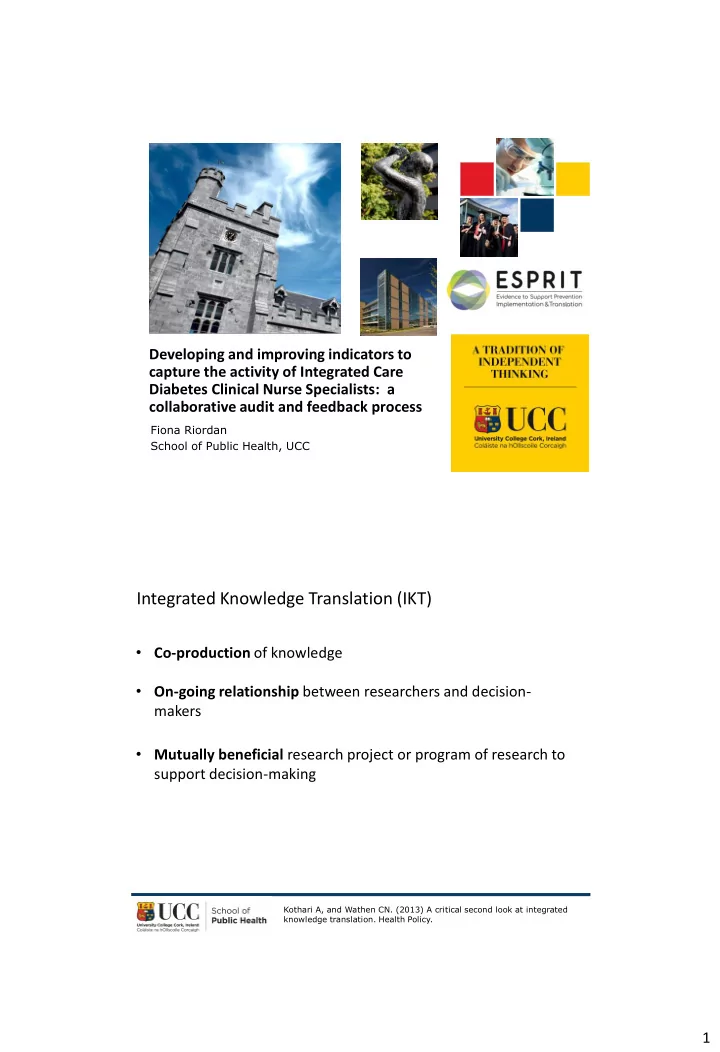

Developing and improving indicators to capture the activity of Integrated Care Diabetes Clinical Nurse Specialists: a collaborative audit and feedback process Fiona Riordan School of Public Health, UCC Integrated Knowledge Translation (IKT) • Co-production of knowledge • On-going relationship between researchers and decision- makers • Mutually beneficial research project or program of research to support decision-making Kothari A, and Wathen CN. (2013) A critical second look at integrated knowledge translation. Health Policy. 1
National Clinical Programme for Diabetes 1. Develop standardised integrated care pathways 2. Clinical Nurse Specialist Diabetes Integrated Care • Primary care-based specialist service for complicated type 2 diabetes • Support to GPs and Practice Nurses • Provide education and training • Work as part of multidisciplinary team (MDT) in secondary care Activity data Data collection was a ‘ground up’ process initiated and driven by nurses (part of the Primary Care Diabetes Nurse Network) Why? 1. Monitoring implementation of role 2. Generate a benchmark 3. Demonstrate feasibility of the approach 2
• Existing relationship with National Clinical Programme • National Working Group • On-going work Activity data: problems • Different levels of detail • Inconsistent reporting • Missing data • No process for monitoring • Definitions unclear Are indicators reflecting what they should? 3
IKT approaches and strategies Evidence briefs Deliberative dialogues Priority setting Training sessions Consultation Committees, boards, working groups Meetings (conference, presentations, workshops) Joint research Audit and feedback Gagliardi et al. (2016) Integrated knowledge translation (IKT) in health care: a scoping review Collaborative audit and feedback process Leads to small but important improvements in professional practice Most effective when …. - Baseline performance was low - Feedback was delivered more than once - Written and verbal - Include explicit targets and an action plan Aim Refine and develop indicators to make them more concise and useful Ivers et al. (2012) Audit and feedback: effects on professional practice and healthcare outcomes 4
Involvement in IKT Decision-maker (nurses) Researchers Conceptualize and plan √ √ Recruit or collect data √ X Interpret findings √ √ Disseminate or implement √ √ Full, Partial, No involvement 2 year collaboration Partnership agreed Feb 2016 Multiple interactions May 2018 Annual report March 2016 & feedback March 2017 ‘Challenges’ Presentation (open forum) Sept. 2016 April 2018 Presentation Presentation & feedback (survey) Indicators Indicators Indicators revised (1) revised (2) revised (3) 5
Interim feedback (survey) – Sept. 2016 Short (anonymous) survey post-presentation at the national meeting of the professional association (IDNMSA) 20 nurses in attendance 15 questions Understanding Usefulness Comprehensiveness Preferences for future feedback 17/20 returned questionnaire (68%) 82% of respondents (n = 14) indicated there were other indicators that should be recorded: • Patient education (65%) • Professional education (71%) Useful if we got an • Phone consultations (59%) email with a summary of our data Useful, but would like to analyse my own area more closely so before national meeting [I] would like an online report” Receiving feedback preferences : 31% presentation; 19% report only; 50% both 6
2 year collaboration Partnership agreed Feb 2016 Multiple interactions May 2018 Annual report March 2016 & feedback March 2017 ‘Challenges’ Presentation (open forum) Sept. 2016 April 2018 Presentation Presentation & feedback (survey Indicators Indicators Indicators revised (1) revised (2) revised (3) Feedback (open forum) – April/May 2018 Discussion on annual report 5 nurses attending regional network meeting • Further data should be collected to ensure role is reflected • Some indicators could be defined better • Data collection process feasible in current form 7
Barriers Annual report Difference in research goals, methodologies and languages • Differing needs and priorities among participants • Goals, roles, and expectations not clear • Lack of funding or infrastructure for IKT • Little continuity of involvement due to staff turnover , infrequent attendance • Participants (nurses and researchers) are busy with multiple responsibilities Gagliardi et al. (2016) Integrated knowledge translation (IKT) in health care: a scoping review Enablers • Strong leadership commitment, skill, and experience • Support from facilitators, champions, and boundary spanners • Establish partnership early in the research process • Openness of partners to listen, learn, and adapt • Built on pre-existing relationship Gagliardi et al. (2016)Integrated knowledge translation (IKT) in health care: a scoping review 8
Conclusions Co-production of knowledge Improved indicators, new indicators On-going relationship between 2-3 year collaboration researchers and decision-makers Mutually beneficial research 1. Refined indicators project or program of research to -Revised minimum dataset support decision-making -Shared definitions 2. Use data for other project s (e.g. programme evaluation) 3. Understanding how to pitch material to clinical and policy stakeholders Kothari A, and Wathen CN. (2013) A critical second look at integrated knowledge translation. Health Policy. Acknowledgements Professor Patricia Kearney Dr Sheena McHugh Helen Twamley Niamh Smyth ESPRIT: Evidence to Support Prevention Implementation and Translation http://www.ucc.ie/en/esprit/ 9
Recommend
More recommend